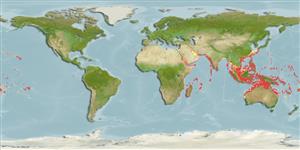Common names from other countries
Environment: milieu / climate zone / depth range / distribution range
ນິເວດວິທະຍາ
ສັດທະເລ ກ່ຽວກັນຫີນ; ບໍ່ມີການເຄື່ອນຍ້າຍ; ລະດັບຄວາມເລິກ 1 - 100 m (Ref. 48391). Tropical; 31°N - 28°S, 32°E - 144°W
Indo-Pacific: Red Sea and East Africa to Line and Tuamoto islands, North to southern Japan and the Ogasawara Islands, South to the Great Barrier Reef, New Caledonia, and the Austral Islands (Ref. 33390). Mention from Hawaii Is., but likely to be aquarium releases (Ref. 58302). Not found in Easter Island, Rapa and the Marquesan Islands (Ref. 48391).
Length at first maturity / ຂະໜາດ / ນ້ຳໜັກ / Age
Maturity: Lm 25.0 range ? - ? cm
Max length : 40.0 cm SL ຕົວຜູ້/ບໍ່ມີເພດ; (Ref. 30573); ອາຍຸສູງສຸດທີ່ເຄຍລາຍງານມາ: 14 ປີ (Ref. 72479)
ຄີ (ໜາມ)ແຂງຢູ່ຫຼັງປາ (ທັງໝົດ) : 13 - 14; ຄີຫຼັງຂອງປາ (ຄີອ່ອນ) (ທັງໝົດ) : 17 - 21; ຄີ(ໜາມ) ແຂງຢູ່ຄີກົ້ນປາ
ກຸ່ມປາກະດູກແຂງ
ຄວາມຖີ່ຂອງກຸ່ມຖ່າຍທອດພັນ
ປາທີ່ມີການເຄື່ອນຍ້າຍຈາກທະເລໄປຫານ້ຳຈືດ ແລະນ້ຳຈືດຫາທະເລ
ປາທີ່ມີການເຄື່ອນຍ້າຍຈາກທະເລແລະໄປໄຂ່ຢູ່ນ້ຳຈືດ
ຄີກົ້ນຂອງປາ
ສັດທີ່ມີກະດູກສັນຫັຼງ
ການຖ່າຍທອດທາງກຳມະພັນຈາກພໍ່ແມ່ຫາລູກ: 3; ຄີກົ້ນຂອງປາ: 18 - 21.
Juveniles are encountered under ledges, or in holes of outer lagoon patch reefs or semi-protected areas of exposed channels and outer reef flats. Subadults move to reef front holes and surge channels. Large adults inhabit ledges and caves in areas of rich coral growth on clear lagoon, channel, or seaward reefs (Ref. 6113). Benthopelagic (Ref. 58302). Feed on sponges and other encrusting organisms (Ref. 6113); also on tunicates. Form pairs. Young and adults may clean much larger fishes such as sunfish (Ref. 48636). Frequently exported through the aquarium trade. Juveniles are distinguished by a white dorsal-fin margin (Ref. 48391).
Myers, R.F., 1991. Micronesian reef fishes. Second Ed. Coral Graphics, Barrigada, Guam. 298 p. (Ref. 1602)
IUCN Red List Status (Ref. 130435)
CITES (Ref. 128078)
Not Evaluated
Threat to humans
Harmless
Human uses
ການປະມົງ: ທີ່ເປັນການຄ້າໜ້ອຍ; ຕູ້ປາ: ເປັນສີນຄ້າ
ເຄື່ອງມື
Special reports
Download XML
ແຫຼ່ງອີນເຕີເນັດ
Estimates based on models
Preferred temperature (Ref.
115969): 24.6 - 29, mean 27.9 (based on 1496 cells).
Phylogenetic diversity index (Ref.
82804): PD
50 = 0.5001 [Uniqueness, from 0.5 = low to 2.0 = high].
Bayesian length-weight: a=0.02512 (0.01462 - 0.04317), b=2.87 (2.73 - 3.01), in cm Total Length, based on LWR estimates for this species & Genus-body shape (Ref.
93245).
ຊັ້ນເຂດຮ້ອນ (Ref.
69278): 2.9 ±0.05 se; based on food items.
ຄວາມຢືດຢຸ່ນ (Ref.
120179): ຕຳ່ຫຼາຍ, ປະຊາກອນຕຳ່ສຸດທີ່ໃຊ້ເວລາສອງເທົ່າຫຼາຍກວ່າ 14 ປີ (Preliminary K or Fecundity.).
Fishing Vulnerability (Ref.
59153): High to very high vulnerability (68 of 100).
